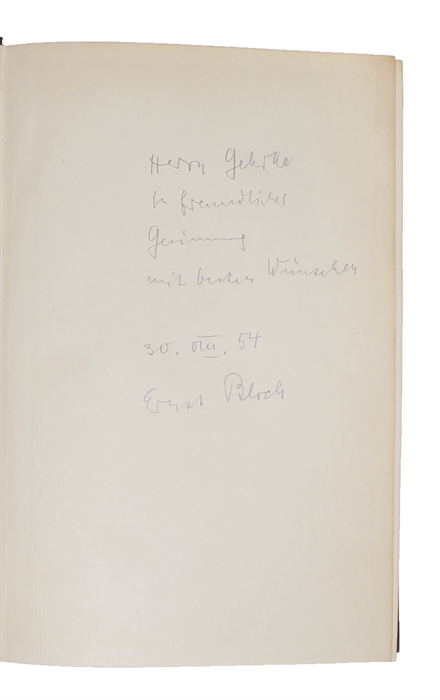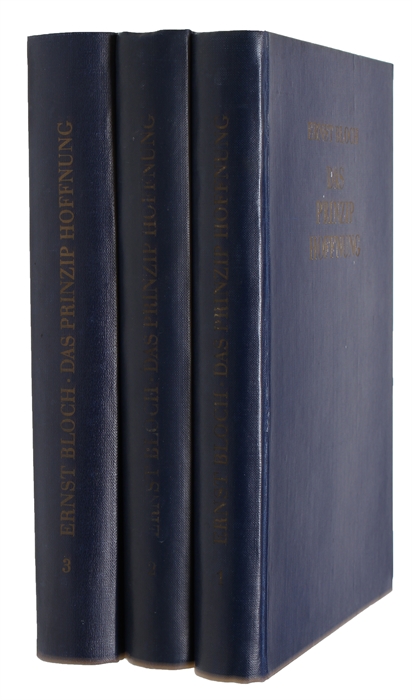THE PRINCIPLE OF HOPE - PRESENTATION-COPY
BLOCH, ERNST.
Das Prinzip Hoffnung. 3 Bde.
Berlin, 1954-59. Lex 8vo. All three in the original blue full cloth bindings, in excellent condition, in- as well as ex-ternally. Some light pencil-underlinings. 477, (3); 512, (1); 518, (1) pp. + Errata for vols. I+II laid loose in vol.
With a five-line presentation-inscription to front free end-paper of volume 1, signed in full: "Herrn Gehrke/ in freundlicher Gesinnung/ mit besten Wünschen/ 30.VIII.54/ Ernst Bloch".
The scarce first edition of all three volumes, with signed and dated presentation-inscription (in the year of appearance), of Bloch's magnum opus, his seminal "The Principle of Hope", which constitutes his philosophy of concrete utopia.
The hugely influential German philosopher Ernst Bloch (1885-1977) was born as the son of Jewish parents in Ludwigshafen. He studied philosophy, physics, German and music in Munich and Würzburg and later became a main figure in Neomarxism. As his first book, "Geist der Utopie" was written while in exile in Switzerland during the First World War, this his main work was written while in exile in America during the Second World War, between 1938 and 1947, and it appeared for the first time in the DDR between 1954 and 1959.
"The Principle of Hope" is considered a philosophical-political piece of art, which consideres in both philosophical-scientific and humanistic ways the possibilities for a utopia, at the same time as it traces throughout history man's strivings for utopia. The world is presented as open to man - open for man to make it the place that enables us to live like proper human beings. "Ernst Bloch's Principle of Hope is one of the key books of our century. Part philosophic speculation, part political treatise, part lyric vision, it is exercising a deepening influence on thought and on literature. . . . No political or theological appropriations of Bloch's leviathan can exhaust its visionary breadth." (editorial review by George Steiner, the 1986 English language edition).
As his "Geist der Utopie" begins with the powerful words: "What now? It is enough. Now we have to begin. Life has been put in our hands. In itself it has already become empty long ago. It staggers senselessly around, but we stand firm, and thus we want to be its Faustus and its ends.", so his "Das Prinzip Hoffnung" begins with the equally powerful words: "Who are we? Where do we come from? Where are we going? What do we expect? What awaits us? Many feel as nothing but confused. The ground rocks, they do not know why and from what. This their state is fear, if it becomes more defined, it is fear. Once, someone set out to learn fear." (""Wer sind wir? Wo kommen wir her? Wohin gehen wir? Was erwarten wir? Was erwartet uns? Viele fühlen sich nur als verwirrt. Der Boden wankt, sie wissen nicht warum und von was. Dieser ihr Zustand ist Angst, wird er bestimmter, so ist er Furcht. Einmal zog einer aus, das Fürchten zu lernen."
The conception of "Prinzip Hoffnung" has now, due to this work, become a frequently used saying, not only in Germany, but also in America and large parts of Europe, where "The Pronciple of Hope" is used in numerous political and economical discussions, most actually for instance in the climate debate. The influence of the work has been immense, and it has done much to re-create modern man's belief in the world today and our ability to do good.
Order-nr.: 49060


